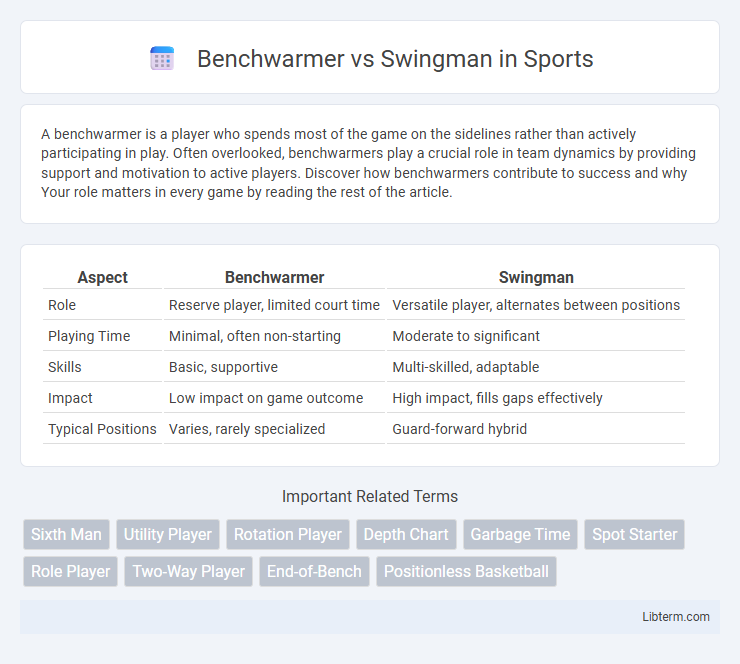A benchwarmer is a player who spends most of the game on the sidelines rather than actively participating in play. Often overlooked, benchwarmers play a crucial role in team dynamics by providing support and motivation to active players. Discover how benchwarmers contribute to success and why Your role matters in every game by reading the rest of the article.
Table of Comparison
| Aspect | Benchwarmer | Swingman |
|---|---|---|
| Role | Reserve player, limited court time | Versatile player, alternates between positions |
| Playing Time | Minimal, often non-starting | Moderate to significant |
| Skills | Basic, supportive | Multi-skilled, adaptable |
| Impact | Low impact on game outcome | High impact, fills gaps effectively |
| Typical Positions | Varies, rarely specialized | Guard-forward hybrid |
Understanding the Terminology: Benchwarmer vs Swingman
A benchwarmer refers to a player who spends most of the game on the sidelines, seldom participating in actual play, often contributing during practice or as a backup option. A swingman, in basketball terminology, is a versatile player capable of playing multiple positions, typically between shooting guard and small forward, providing flexibility in team strategies. Understanding these terms helps distinguish between a player's role related to playing time and their positional adaptability on the court.
The Role of a Benchwarmer in Team Dynamics
The role of a benchwarmer in team dynamics revolves around providing essential support and maintaining high energy levels during games. Benchwarmers contribute by staying mentally prepared, encouraging teammates, and stepping in during critical moments to sustain team performance. Their presence fosters cohesion and resilience, ensuring the team remains adaptable throughout the competition.
Defining the Swingman: Versatility on the Court
The swingman is a versatile basketball player capable of effectively playing both shooting guard and small forward positions, combining the skills of scoring, defending, and playmaking. Unlike a benchwarmer who primarily serves as a substitute with limited court time, a swingman adapts to multiple roles on the court to maximize team dynamics. Their hybrid skill set allows them to exploit mismatches, contribute in scoring drives, perimeter defense, and transition play, making them integral to modern basketball strategies.
Key Differences Between Benchwarmers and Swingmen
Benchwarmers typically serve as reserve players who come off the bench to provide rest for starters, often specializing in specific roles like defense or scoring. Swingmen are versatile players capable of effectively playing multiple positions, usually between shooting guard and small forward, contributing both offensively and defensively. The key difference lies in their versatility and role flexibility: Swingmen adapt to various in-game situations, while Benchwarmer roles focus more on supporting specific game needs during limited minutes.
Skill Sets: What Sets a Swingman Apart
A swingman distinguishes themselves with versatile skill sets that combine the agility and perimeter shooting of a shooting guard with the strength and rebounding ability of a small forward. Benchwarmers typically lack the consistent scoring, defensive versatility, and court awareness that swingmen leverage to adapt seamlessly between backcourt and frontcourt roles. Swingmen excel in both offensive creation and defensive matchups, making them indispensable for dynamic lineups.
The Impact of Benchwarmers on Team Morale
Benchwarmers often play a crucial role in boosting team morale by providing support and encouragement during games, fostering a positive environment even when not actively participating on the court. Their presence helps maintain team cohesion and motivation, contributing to overall performance by cheering and offering strategic insights. Coaches recognize the value of benchwarmers in sustaining energy levels and creating a unified team dynamic throughout the season.
How Coaches Utilize Swingmen in Game Strategies
Coaches utilize swingmen to maximize lineup flexibility by seamlessly alternating between shooting guard and small forward positions, allowing for dynamic offensive and defensive adjustments. Swingmen's ability to guard multiple positions enhances defensive versatility, enabling coaches to switch defensive schemes without substituting players. Their role often includes facilitating ball movement and exploiting mismatches, crucial for executing fast-paced and adaptive game strategies.
Career Progression: From Benchwarmer to Swingman
Starting as a benchwarmer allows players to develop foundational skills and gain crucial game experience while observing team dynamics. Progression to a swingman role typically involves enhanced physical conditioning, diversified skill sets, and increased strategic understanding, enabling contributions on both offense and defense. Consistent improvement in shooting, agility, and versatility is essential for transitioning from limited playtime to a reliable swingman position.
Notable NBA Examples: Benchwarmers and Swingmen
Notable NBA examples highlight the distinct roles of benchwarmers and swingmen, with benchwarmers like Derek Fisher providing crucial support and leadership off the bench, contributing to team depth and strategic flexibility. Swingmen such as Paul George and Tracy McGrady showcase versatility by effectively playing both shooting guard and small forward positions, offering scoring, defense, and playmaking abilities. These roles emphasize the importance of adaptable skill sets and situational impact in professional basketball rosters.
The Future of Hybrid Roles in Basketball
The future of hybrid roles in basketball highlights the evolving distinction between benchwarmers and swingmen, with swingmen increasingly valued for their versatility in both perimeter shooting and defensive adaptability. As analytics emphasize positionless basketball, players who blend traditional wing skills with bench-level energy provide strategic depth, fostering a dynamic rotational approach. Teams are investing in swingmen capable of shifting between small forward and shooting guard roles while benchwarmers must innovate to maintain relevance in faster, more flexible playing styles.
Benchwarmer Infographic

 libterm.com
libterm.com